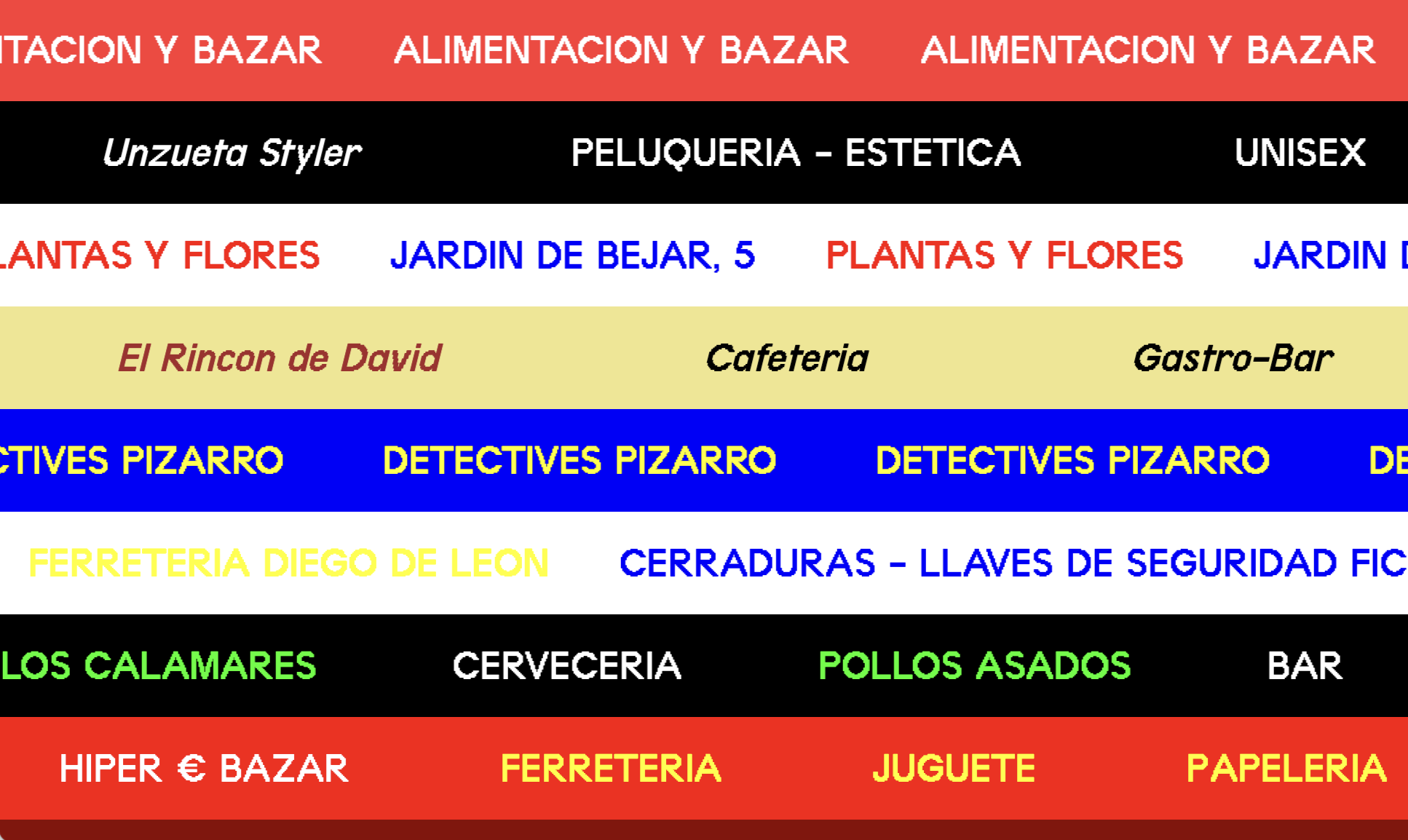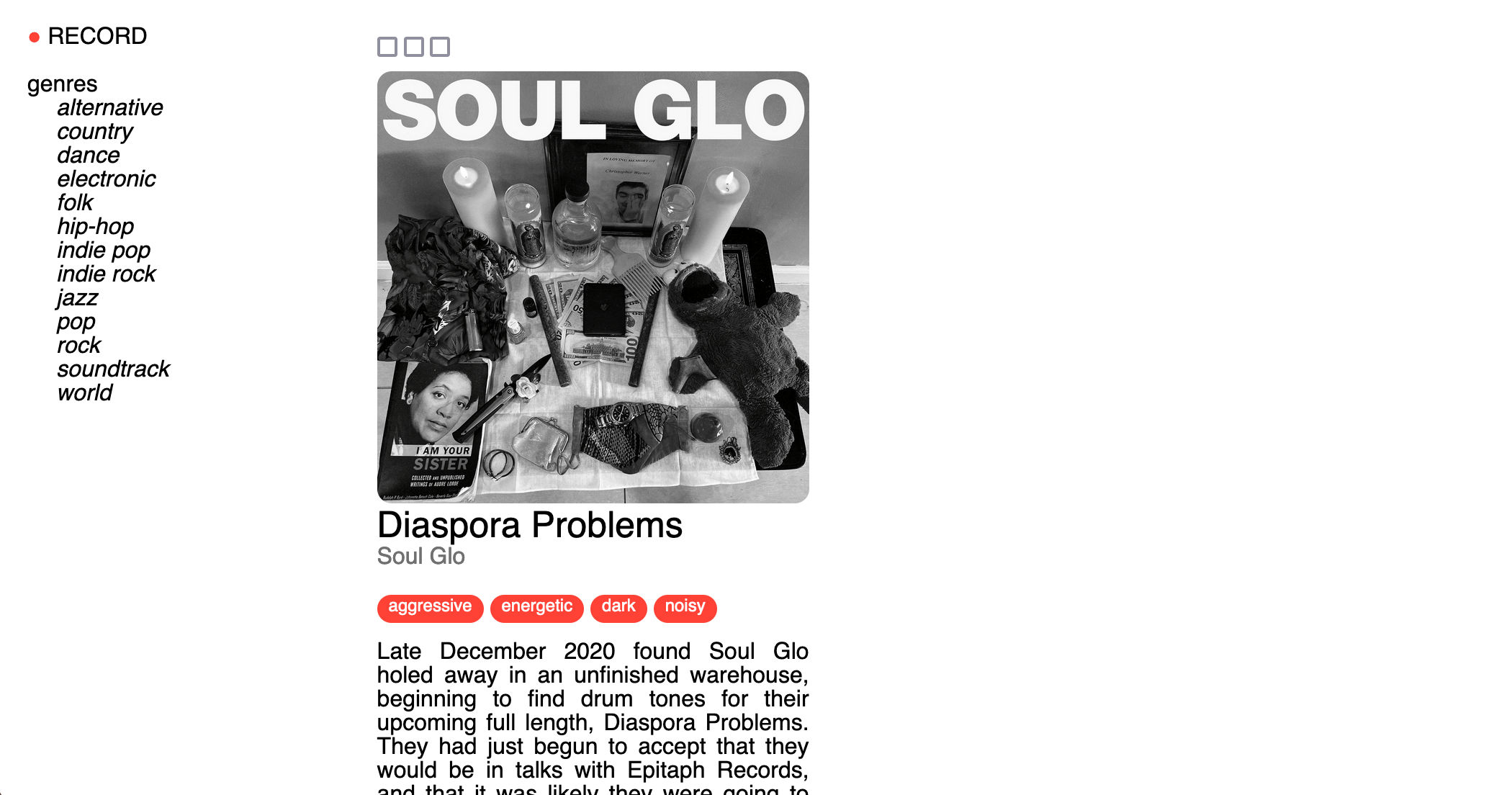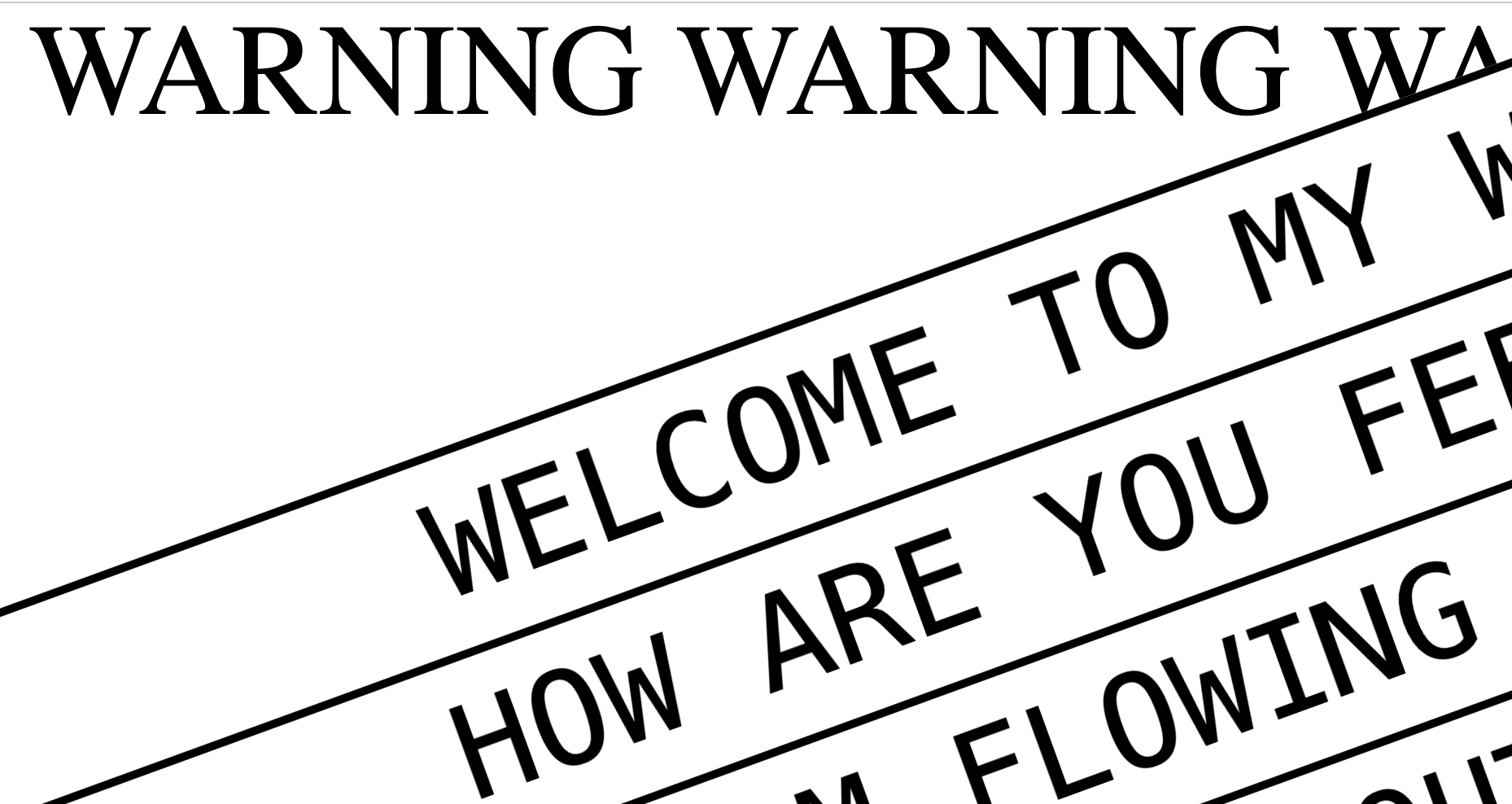Nami (N): Could you please introduce yourself?
Enrique (E): My name is Enrique Krahe. I study Graphic Design in Willem de Kooning Academy, 2nd year. I'm originally from Spain. I have been living in the Netherlands for long time. And in Graphic Design, I'm very interested in the creative coding aspect of it, along with experimental editorial design. Before going to your course I explored python a bit. I'm interested in it because I find it's a discipline where the Graphic Design and the coding meets.

N: What you have just said implies that the enrolment for HTML Zine Club was your own choice, right?
E: Yes, I was reading descriptions about courses on the school platform. And it was the most interesting one. Having already done a bit of HTML&CSS, I still wanted to take more time to really do that , because I couldn't totally dedicate since I was doing other projects too. Thus I considered yours as a chance to explore them more.
N: This is naturally connected to what I wanted to ask you as a next question; Didn't you feel like my course was way too simple or low after kick-off, because it aimed to only explore these two languages? Hearing you, you already had some coding experiences thus maybe could have been interested in jumping to (so-called) more dynamic programming languages such as Javascript. I personally believe these two basic languages have amazing potentials, but I'm aware some argue that these are not programming languages at all because they think they're just static. And also imost of places in the tech job market require skills in Javascript or JS-based libraries.
E:I didn't expect it to be already hifi or skilful. I mean I didn't know the HTML and CSS enough. When you showed your works and other references, I saw there are many possibilities outside of what we normally see from the usual web industry. All the complicated and intricate web projects of yours, including animation for instance, I don't know if I truly explored that in my own projects but still it was something very interesting to find that a few basic lines of codes can make something intriguing.
N: What kinds of digital products/softwares/tool have you explored?
E: In WDKA Graphic Design, we've explored Adobe products such as Indesign. Apart from that we haven't done too many other Adobe things. As for other digital products, we have learned a bit of HTML, CSS, and JS in the 1st year as an introduction. In the 2nd year we learned these a bit more.
N: Ok, so you still have classes about the them in the 2nd year.
E: Yes, we have to make our portfolio websites. For that, we have some specific assignments. We also get introduced about Webflow, which is no-code website builder.
N: Aha, the builder is also introduced as well. I guess it's for practical and realistic reason because not every student can manage making her/his website with the hand-coding?
E: The course wants the students to do the hand coding. However, they decided to introduce the builder as a substitution for that reason. There were another electives regarding to the coding, which were a course exploring P5JS and Processing. But the Elective is what you choose yourself. Every year people keep understanding the web knowledge. From the third year, which is soon for me, we have to build a real portfolio website with photos and process of our works. It will take place when the new semester starts.
N: I remember I also did that too. I'm not sure if we had that in the 3rd year. I think in my case, we had a week called portfolio bootcamp in the beginning of the 2nd year, which was literally about making a real portfolio website of yours. I'm now wondering.. Do you know how you're going to make your portfolio website?
E: I don't think I will hand-code my website. Firstly, we only have one week to finish it and I think it's not enough time to make a complete website with the practice. And there are certain tools that are given by the university. For instance, Cargo is the one, which is a nice website builder. I still think that hand-codes with HTML & CSS& etc are good because you control things by yourself, but it's not very visual. It's not as visual as Cargo. And you can also simultaneously design and make the website. In case of the hand-coding, you'd better have design for your website first. But the interface from such builders allow you to have more efficiency in development. You can also gain a bit of insight how the code works I think.
N: I see... Yes, I think it's indeed a realistic option, considering the completeness of the project in the tight timeline. It's a kinda new story that the builders are offered by the school!It seems like many changes have been made after my graduation. (It also implies how old I am lol) But yea, I understand depends on what context/product you build, you would see the limitation of a method.
E: I still think hand-coding is nice though. It's a way to get out of your comfort zone, because you don't have to stick to the predefined templates.

N:Yea, but what also think is that it's also dangerous to claim that the hand-coding practice is always nicer than working with CMS or framework. Personally I'm a big fan of the hand code but I also try to be conscious to avoid the binary way of thinking. Like you said, I can also agree that starting with builder can be an easy and practical way to visually learn how web elements function.
E: Yes I think you learn a lot from both.
N: I have a common question to ask all the students that I interview, and must ask now. Can you share the hand-coding experience in HTML Zine Club? Hahah sorry, seems like I keep assisting my love for the hand-code.
E: Since I already had a bit of knowledge in HTML already I found myself kinda looking at what I I already could do. One thing I find good from the hand-code is, that you get a lot of errors… and you have to solve them on your own. Having exploring various solutions, I also realised that it's not about understanding everything by your heart. It's just more about YOU TRY. In addition, you learn new thing whenever after making mistakes. For instance, you change values and the target element is spinning, although I expected it to be reversed. That's not what I wanted but seeing the unexpected outcomes became a nice reflection.
N: It's very beautiful reflection. Thank you. From the meticulous nice answer, I have to change the direction of our conversation into a little practical realm. Can you share your study experience in the current education institution, especially Graphic Design?
E:…Yes, hmm, (a subtle smile), it's a big topic.
N: Haha yes, sorry.
E: It's nice. You are opened to many possibilities, even outside of
your major too. Inside of my major we take a very open look for
Graphic Design. It's not only about making a logo or brand identity.
You could make a short film and it could be part of your graphic
design portfolio. Tool/program-wise you can also do whatever you
want. If you're interested in learning Blender (3D), you can do
it.
I wouldn't call negative, but one thing that has been a bit
challenging is that you don't learn all the theories and programs in
the Academy. As for the most of design programs, we have been barely
taught in detail. Maybe Indesign a bit. But
as for Photoshop and Illustration, not at all. But it's not
necessarily bad because you learn these yourself, which makes you
learn what you really need. It's like two sides of a coin. Freedom
vs Disciplined.

N: Yes I agree, my impression for WDKA is also that, it's not linear.
E: I know an Art academy in the Netherlands offers their students quite thorough courses to develop the practical skills so that they can be more proficient. But I'm generally happy with the place where I am.
N: It is nice to hear that you're happy with your academic experience. Seems like my interview is becoming longer than I expected. Sorry fo that. As a last question, I'm wondering if you, as the 3rd year Graphic Design student, have any plan to confront with the job market, because being situated in the reality is coming soon... Sorry if it sounds like I'm scaring you. I don't mean it, of course. In which stance are you facing it? Or is there any concern about it?
E: For me… every couple of week, after projects, I get existential crisis. I ask myself: 'Am I really a graphic designer?', 'Is it what I really want to do?', etc. I also noticed that from my friends. Especially these days with the introduction of AI-based system in the design and tech industry, economic possibilities might be reduced. I'm aware of the fact that the machine learning-realted practice is impacting the field a lot. This makes me think like we should get more classes about it in the academy. Another thing is that, I heard in WDKA, there are some classes about economy of artists or how to presents yourself as designer or artist to the world. Indeed, the question 'How do I make living out of it' is crucial too. But right now I'm not struggling with it too much. Cus I see Graphic Design as one tool. I don't want to only be a graphic designer. I see economic possibility is not only one. In this sense I'm not too worried. I might want to learn from the Graphic Design, but coding along with it can offer me more opportunities to explore more worlds… Graphic designer is an emotion designer. I like WDKA because you can have various approaches. I'm not only a designer making logo. I hope to be also able to explore photography at some point.
N: Thank you for thoughtfully sharing some pieces of your mind with me. I can feel some...quiet but strong energy from your interview. Also, the flow of the interview with you went very naturally. I wasn't too conscious of having to lead the conversation or moderate it. I felt like I was just talking with a friend. Thank you for joining to the interview. It was nice to see your perspective.
E: It was also first time that I'm interviewed by someone. It was a fun experience for me too. Thank you and good luck with your project.